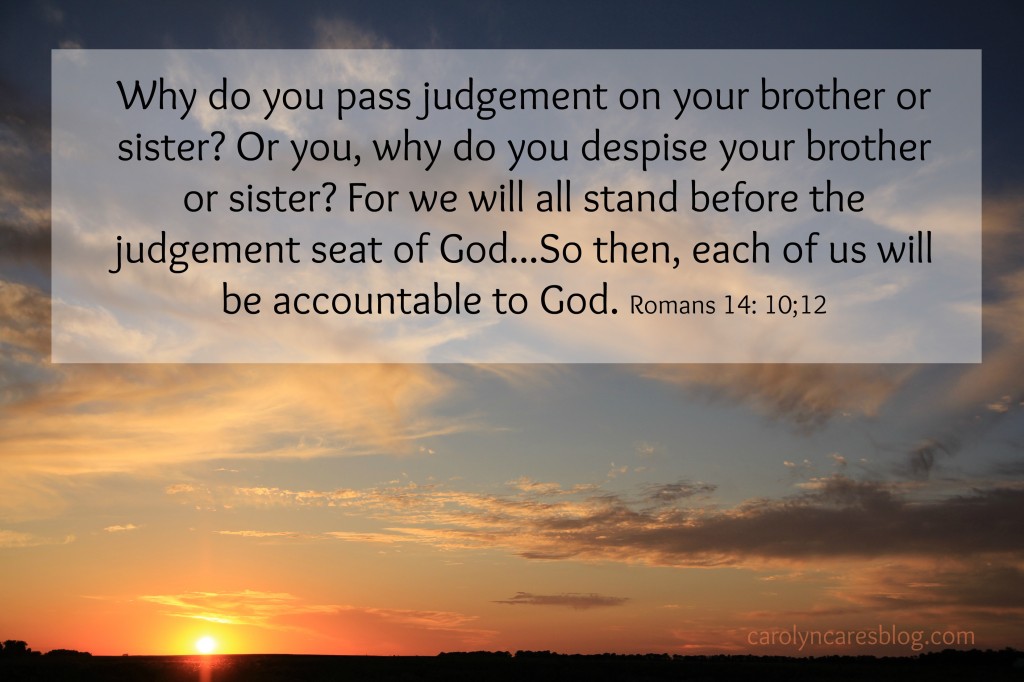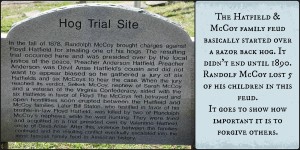Sunday’s second lesson was a doozy. Hello, conviction, guilt, and being humbled! Read the full text below. Don’t just skim it, read it.
Romans 14: 1-12
Welcome those who are weak in faith, but not for the purpose of quarreling over opinions. 2 Some believe in eating anything, while the weak eat only vegetables. 3 Those who eat must not despise those who abstain, and those who abstain must not pass judgment on those who eat; for God has welcomed them. 4 Who are you to pass judgment on servants of another? It is before their own lord that they stand or fall. And they will be upheld, for the Lord is able to make them stand.
5 Some judge one day to be better than another, while others judge all days to be alike. Let all be fully convinced in their own minds. 6 Those who observe the day, observe it in honor of the Lord. Also those who eat, eat in honor of the Lord, since they give thanks to God; while those who abstain, abstain in honor of the Lord and give thanks to God.
7 We do not live to ourselves, and we do not die to ourselves. 8 If we live, we live to the Lord, and if we die, we die to the Lord; so then, whether we live or whether we die, we are the Lord’s. 9 For to this end Christ died and lived again, so that he might be Lord of both the dead and the living.
10 Why do you pass judgment on your brother or sister? Or you, why do you despise your brother or sister? For we will all stand before the judgment seat of God. 11 For it is written,
“As I live, says the Lord, every knee shall bow to me,
and every tongue shall give praise to God.”12 So then, each of us will be accountable to God.
Yikes! Living in a society that loves to label others, and judge them based on our own standards of what is “right” and what is “wrong” is not very Christ-like, is it?
What does this mean for agriculture advocates?
Agvocating, according to those who coined the term, is about “listening to others…and connecting with those outside of agriculture.” It is about opening doors to allow for dialogue. In the post that I linked to, it also describes agtivists, and what the differences are. There is one part of agtivism that pertains to the scriptures above. Mike Haley wrote, “Individuals practicing agtivism, or agtivists’ often take offense to others with opposing views and dismiss theirs concerns about agriculture to prove their point that today’s agriculture practices must exist in order to feed the world.” By arguing over opposing views, or dismissing their concerns about agriculture, we are passing judgement on our target audience. We are telling them that their concerns are not important, or valid; they must think like we do in order to be right. But what if they are fully convinced in their own minds that their choices are right for them and their family? Do you treat them as a brother or sister, or do you despise them and call them unsavory names in forums where you think they will not see? “Why do you pass judgment on your brother or sister? Or you, why do you despise your brother or sister? For we will all stand before the judgement seat of God.”
I am thankful for forgiveness
Today’s gospel lesson and sermon talked about forgiveness. A few points have really stuck with me.
I am so thankful for forgiveness. Remember me talking about feeling convicted, guilty, and humbled? I know that I am forgiven. I don’t always think I deserve it, but God is merciful.
The gospel lesson and sermon also reminded me that I need to forgive. Asking forgiveness is only a part of the equation. I also need to extend forgiveness, “from my heart”. Not in word alone, but from the heart.
Matthew 18: 21-22
21 Then Peter came and said to him, “Lord, if another member of the church sins against me, how often should I forgive? As many as seven times?” 22 Jesus said to him, “Not seven times, but, I tell you, seventy-seven times.
Look closely at who Peter is concerned about. Another member of the church. For us, it could be a neighbor, another blogger, the customer service representative you need to have fix something, an elected official…anyone you come into contact with whether in person or online. Pastor also explained that seventy-seven times is code for infinity. We can never stop forgiving others. That is not an action that is ever done, or checked off the to-do list. The gospel lesson concluded with a parable about a slave who owed money, and whose debt was forgiven…but he turned around and punished another who owed him a lot less. When his master heard about it, this was the reply:
Matthew 18:32-35
32 Then his lord summoned him and said to him, ‘You wicked slave! I forgave you all that debt because you pleaded with me. 33 Should you not have had mercy on your fellow slave, as I had mercy on you?’ 34 And in anger his lord handed him over to be tortured until he would pay his entire debt. 35 So my heavenly Father will also do to every one of you, if you do not forgive your brother or sister from your heart.”
Putting it all together
We should not judge others based on differences of opinion about food choices, farming choices, or lifestyle choices. Judgmental attitudes create tension, mistrust, and anger. I’m not sure any of those feelings are helpful when agvocating, or life in general. Agvocating can be done in a way that is positive, and creates conversations. That should be the goal. You don’t need to write about what your neighbor is doing, or throw others under the bus because you don’t like their choices. Sharing your own story, or using some of Ryan Goodman’s 88 blog topic ideas for agriculture bloggers are great ways to start putting positive messages out there.
There are times, however, when we will fail. We all do. Which is why we must forgive, and ask forgiveness. Seventy-seven times. To infinity, and beyond. Forgiveness heals relationships, it opens doors to friendships, and it is freeing. Walking around grumbling about who wronged you takes energy, and makes you miserable to be around. At least, that’s what my family tells me.
So, instead of looking for ways others are wrong so you can ‘set them straight’, look for ways to tell your own story. Listen to those who have a different opinion, and don’t rush to judgement. Forgive those who have hurt you, and seek the forgiveness of those you have hurt.
There is a song in our hymnal that I thought would be appropriate to close with.
In All Our Grief
Help us to put aside the angry word,
the clenching fist, the wish and will to hurt.
Teach us the way in which love best is served.
Lord, have mercy, Christ have mercy,
Lord, grant us peace.
-Sylvia Dunstan
Related posts:

